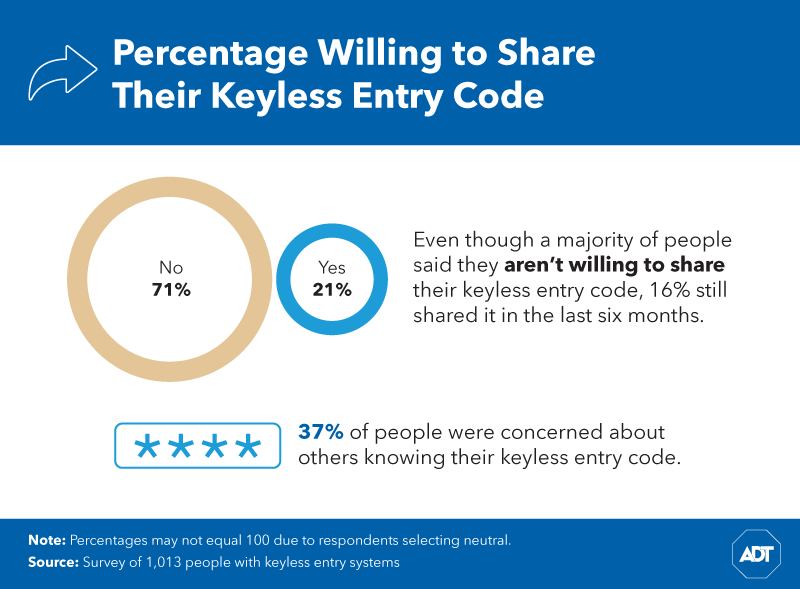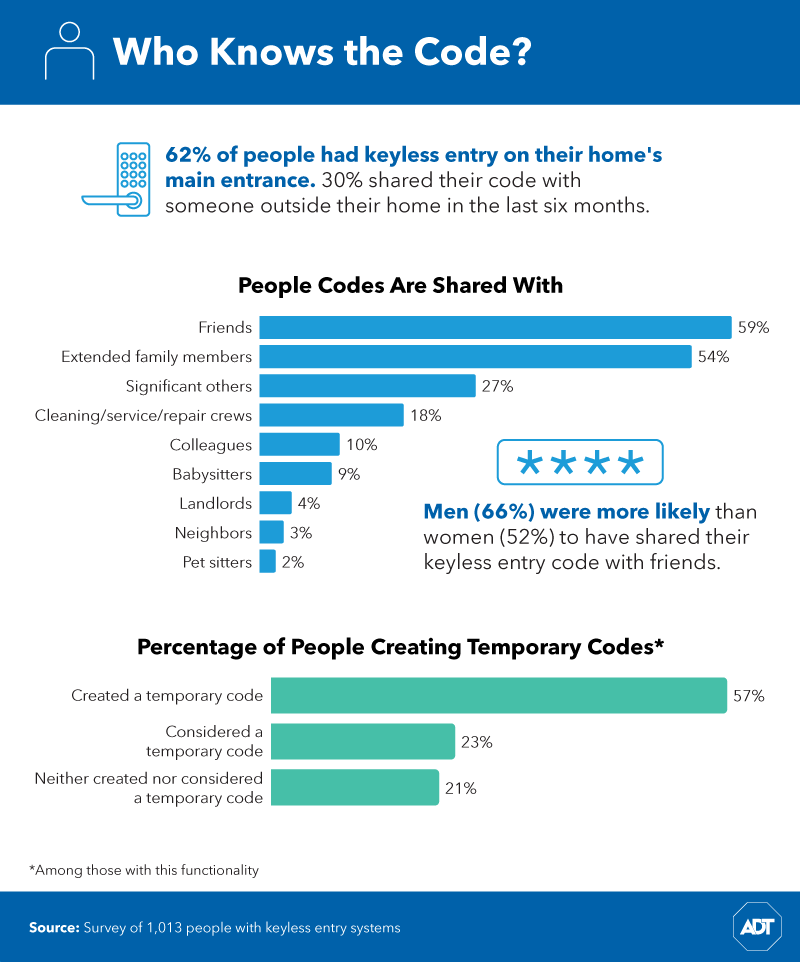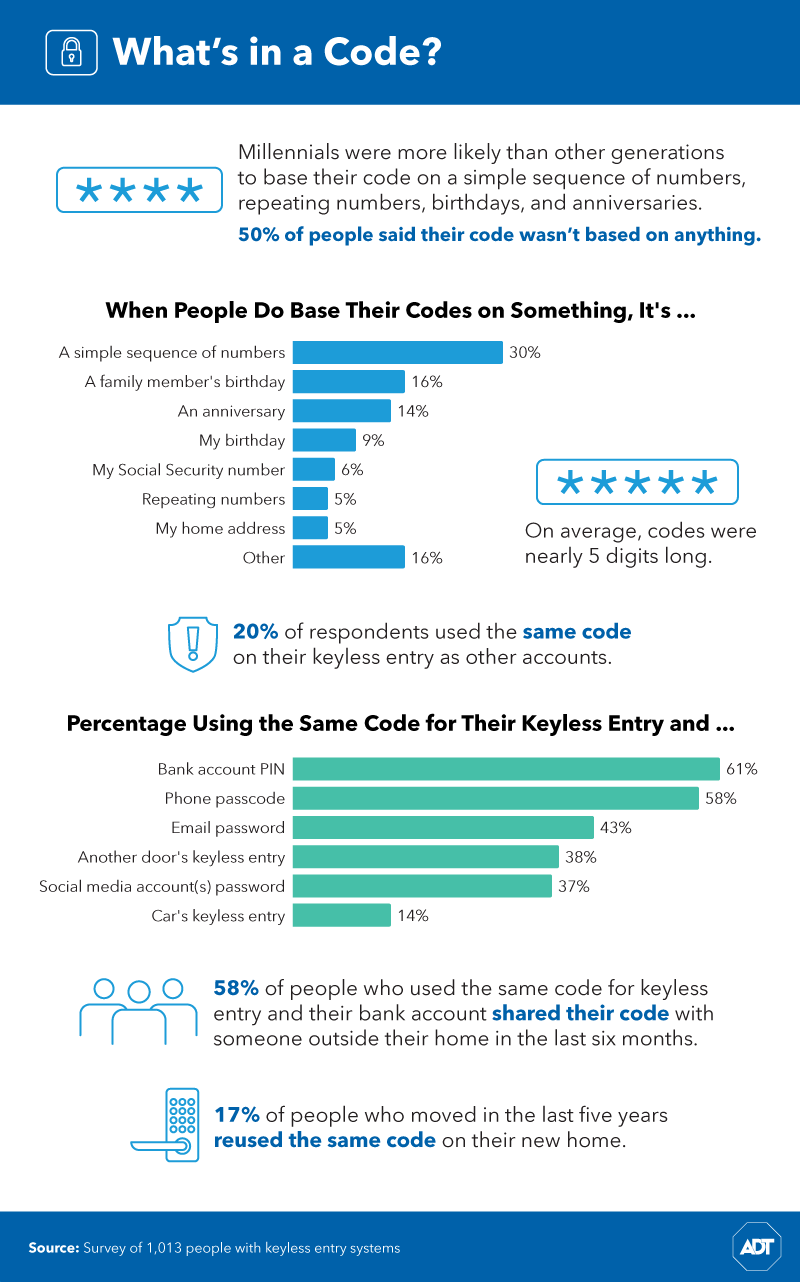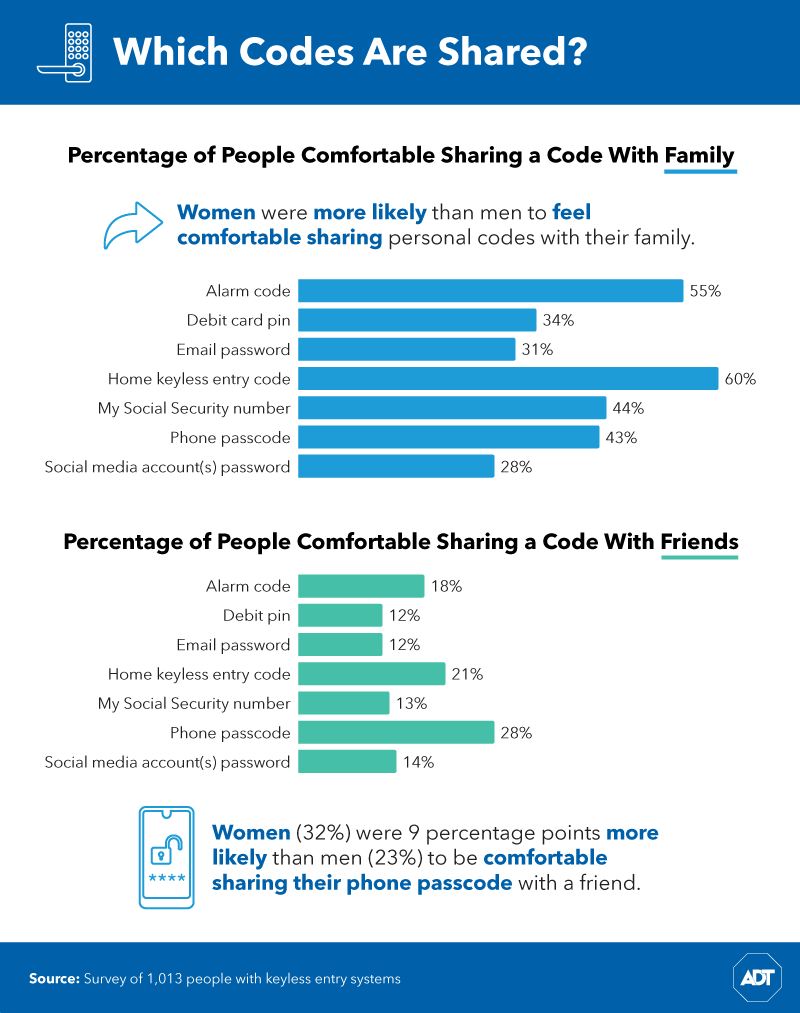In an increasingly digital existence, our relationship with technology has evolved from a nice-to-have convenience to new standards in communication, productivity, and security. The idea of "smart" utilities at home might have felt futuristic a decade ago, but today, app-controlled lights, cameras, and lock systems have changed the way we think about keeping our families and homes safe.
Smart locks provide keyless entry into our homes, real-time alerts whenever a door opens or closes, and mobile access to lock or unlock doors from anywhere. But while smarter security is certainly more convenient than the alternative, our habits and behaviors with smart devices might be leaving us less safe than we realize.
With the added convenience of smart locks and keyless entries, many people are giving their codes out indiscriminately or using common codes (like their birthdays) to keep their doors locked, putting themselves at risk. How many? To find out, we surveyed over 1,000 people to find out how comfortable they are sharing the details of their home security systems with family, friends, and others. Explore how often people share their keyless entry codes, whom they share them with, and the kinds of codes they're choosing in the first place.
Open Sesame

Smart locks provide an additional level of security You could accidentally leave your keys at home and still know that the doors are locked, or you could see who's coming and going while you're away. Even from afar, smart home technology gives you the power to remotely arm your home security systems and receive alerts directly to your smartphone if someone attempts to access the doors or windows.
Still, keyless entry typically involves a numerical code to lock and unlock doors, and protecting that code can be just as important as protecting the physical keys to your home. A majority of people, 71%, said they were unwilling to share their smart lock code with other people, and 37% were concerned about the idea of other people knowing their codes. Nonetheless, 21% of people said they were willing to share their home codes, and 16% indicated having given out their codes within the last six months.
Access Granted

Of the more than 1,000 people surveyed, 62% said they have keyless entry set up on the main entrance into their home, and 30% admitted to sharing their entry code with someone who didn't live with them at some point in the last six months.
So, who are we giving access to our homes? More than half of people shared their keyless entry code with friends (59%) and extended family members (54%), followed by a significant other (27%) and the people who clean or service their home (18%). Men (66%) were more likely to share their home security code with friends compared to women (52%).
Overwhelmingly, 66% of all burglaries are residential break-ins. If you're giving someone who doesn't live with you digital access to your home, it's smarter to create custom codes that let you more closely monitor who's coming and going. Over half of people with smart locks (57%) had created a temporary code, and another 23% had considered it. More than 1 in 5 people with keyless entry systems hadn't made or considered making a temporary code to access their home.
Easy Entry

Smart locks add an elevated level of security to our homes by providing constant alerts and mobile access, but like any PIN-based password system, it's important to ensure you aren't making things too easy to guess.
While half of keyless entry owners said their codes weren't based on anything, 30% admitted they'd picked a simple sequence of numbers. More than any other generation, millennials were the most likely to base their home entry codes off of simple sequences, repeating numbers, birthdays, or anniversaries. Though less common, 5% of keyless entry users identified using repeating numbers or their home address as the access PIN for their system.
One in five respondents also confirmed using the same code for the keyless entry system as other personal accounts, including their bank account PIN (61%), phone passcode (58%), and email address password (43%). More than half (58%) of people using their keyless entry codes for other passwords also identified sharing those codes with someone outside their home in the last six months.
Price of Admission

Even outside of their keyless entry systems, some people may be too willing to share their personal passwords and PIN codes with family and friends.
More than 1 in 3 people identified being comfortable with their family members knowing the last four digits of their Social Security number (44%), their phone passcode (43%), and their debit card PIN (34%). While women were typically more likely than men to feel comfortable sharing their login credentials with relatives, over half of respondents were OK passing out their keyless entry (60%) and alarm system codes (55%) to family members.
Thankfully, people were generally less enthusiastic about giving their personal information out to friends compared to family members. At most, 28% were comfortable sharing their phone passcode with friends, and 21% felt similarly about sharing their keyless entry code. Respondents were less willing to give out their alarm code (18%) or a social media account password (14%) but were more likely to give a friend the last four digits of their Social Security number (13%) than their email password or debit card PIN (both 12%).
New Levels of Home Security
Today, home automation is so much more than digital voice assistants telling you the weather or reading you the news. With all of the options for smart home technology, the way we think about securing our home has changed – and mostly for the better. And while most people were wary of giving out their keyless entry codes at all, many also indicated sharing those details with people outside their home or creating codes that matched other personal accounts.
At ADT, we're passionate about helping you achieve a new level of security with all of the conveniences technology has to offer. ADT Smart Locks go hand in hand with the rest of your ADT security system, giving you programmable locking, nighttime illumination, wireless alerts, and access through the ADT mobile app. Expecting your dog walker between 9 a.m. and 11 a.m.? Maybe someone is coming to work on your home between noon and 2 p.m. No problem. WIth ADT Smart Locks you can set up a unique code just for them that will only work during a specified window of time. Best part, it can all be done from your phone. You'll even get alerts when your lock status changes, always keeping you in the know of the status of your home's safety. Our smart locks offer more customization, giving you control over who knows your code and when. Ready for the next level of home security? Learn more online at ADT.com today.
Methodology and Limitations
Using Amazon Mechanical Turk, we surveyed over 1,000 people with keyless entry systems for their homes. The gender and generational breakdowns for our respondents are as follows:
Women: 553
Men: 458
Nonbinary respondents: 2
Baby boomers or older: 102
Generation X: 275
Millennials: 545
Generation Z: 91
This survey relies on self-reporting; therefore, there are limitations that come with the data, such as under-reporting or exaggeration.
Fair Use Statement
Sharing this article is safer than sharing your keyless entry code, so go for it. We only ask that you do so for noncommercial purposes and link back to the full study here when sharing.
This information is provided for general informational purposes only and should not be relied on in making any buying decisions. Information is deemed reliable but not guaranteed.
© 2020 ADT LLC dba ADT Security Services. All rights reserved. ADT, the ADT logo, ADT Always There and 800.ADT.ASAP and the product/service names listed in this document are marks and/or registered marks. Third party marks are the property of their respective owners.
